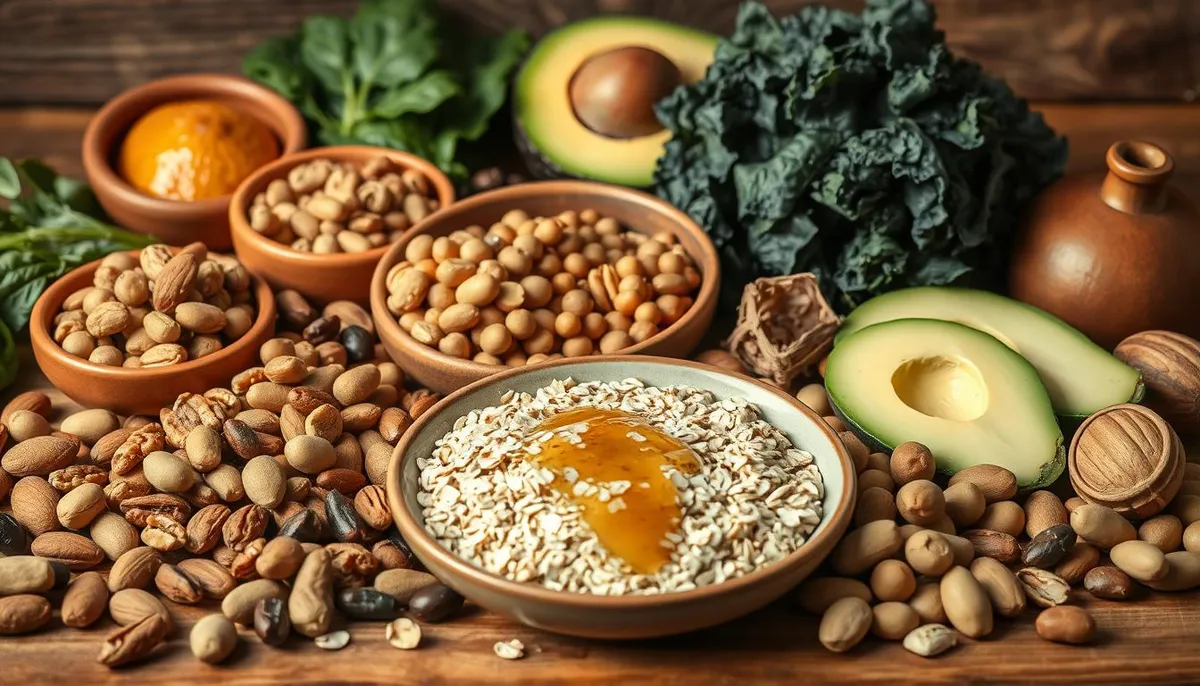Welcome to a journey into strategic eating for a longer, healthier life. Inspired by modern wellness pioneers, we explore how simple dietary choices can have a profound impact. This guide focuses on a powerful nutrient that plays a key role in your well-being.

Tryptophan is an essential amino acid. Your body cannot make it, so you must get it from your diet. This building block is crucial for your brain, nervous system, and immune function.
Your body uses this nutrient to create important molecules. These include serotonin, which regulates mood, and melatonin, which guides sleep. Getting enough through your nutrition supports these vital processes for overall wellness.
Most adults need about 4 milligrams per kilogram of body weight daily. The good news is that average diets often provide between 800-1,000 milligrams. Learning which items are rich in this compound helps you meet your goals easily.
Key Takeaways
- Tryptophan is an essential amino acid your body cannot produce.
- It is a building block for serotonin and melatonin.
- This nutrient supports brain, nervous system, and immune health.
- Most adults need about 4 mg per kg of body weight daily.
- Average diets often meet the basic requirement.
- Strategic nutrition is key for longevity and vitality.
Introduction to L Tryptophan Foods and Longevity
Modern longevity science reveals that targeted nutrition can significantly impact our biological aging process. What we consume plays a direct role in how well we age and maintain vitality.
Strategic eating patterns focus on optimizing cellular function through specific nutrients. This approach goes beyond basic nourishment to support comprehensive wellness outcomes.
Overview of Longevity and Dietary Support
A balanced eating plan provides essential building blocks for sustained health. These nutrients support various bodily systems that contribute to extended healthspan.
The right dietary choices help maintain cognitive sharpness and physical resilience. They work at the cellular level to promote optimal function throughout life.
| Longevity Approach | Primary Focus | Key Components | Health Outcomes |
|---|---|---|---|
| Traditional Nutrition | Basic nourishment | Macronutrient balance | General wellness |
| Strategic Eating | Cellular optimization | Targeted nutrients | Enhanced vitality |
| Data-Driven Wellness | Precision metrics | Supplementation + diet | Maximized potential |
Inspiration from Blueprint Bryan Johnson’s Wellness Approach
Blueprint represents a revolutionary philosophy in personal health optimization. It combines precise measurements with strategic supplementation for remarkable results.
This method demonstrates how data-informed choices can slow aging processes. The approach emphasizes measurable outcomes and continuous improvement.
Essential nutrients like tryptophan fit perfectly into this comprehensive strategy. They support brain performance, metabolic efficiency, and immune resilience for lasting wellness.
The Science Behind Tryptophan and Health
Biochemical processes within our cells transform basic nutrients into powerful regulators of health and longevity. This essential amino acid serves as a building block for critical molecules that influence multiple body systems.
Tryptophan’s Role in Serotonin and Melatonin Synthesis
Your system converts this amino acid into serotonin, often called the “feel-good” neurotransmitter. This conversion supports emotional balance and social behavior regulation.
The same pathway leads to melatonin production, which governs your sleep-wake cycle. Understanding this biochemical journey helps explain how diet affects daily rhythms.
Impact on Brain Function, Sleep, and Immune Health
Research demonstrates that adequate levels support cognitive performance and emotional resilience. Studies from 2016 linked low serotonin to mood challenges and memory issues.
This nutrient also plays a vital role in nervous system operation and immune defense. Its wide-ranging influence makes it crucial for comprehensive wellness.
Optimal levels contribute to restful sleep patterns and metabolic efficiency. The body relies on these processes for sustained vitality throughout life.
How l tryptophan foods Elevate Mood and Sleep
The connection between your plate and your mental state is more direct than you might think. Strategic nutrition offers a powerful, natural path to enhancing your daily emotional wellbeing and sleep patterns.
Boosting Serotonin Levels Naturally
When you consume items rich in this essential amino acid, your body gets the raw material it needs. This compound travels to the brain, where it is converted into serotonin.
Higher serotonin levels are strongly linked to a more positive outlook and emotional balance. Salmon, eggs, spinach, and seeds are particularly effective choices for this natural boost.
This dietary approach provides a sustainable way to support your mood without other interventions.

Enhancing Sleep Quality with Dietary Tryptophan
The same process that elevates your mood also prepares your body for rest. Serotonin is a precursor to melatonin, the hormone that regulates your sleep-wake cycle.
Supporting this biochemical pathway can lead to more restful and restorative sleep. People facing sleep challenges may find significant benefit from focusing on their intake.
You might need a slightly higher amount of this nutrient to experience these specific advantages. Making intentional choices at mealtime becomes a simple tool for managing both your mood and your rest.
Top Plant-Based Tryptophan Sources
Nature provides an abundance of plant foods that deliver impressive nutritional benefits for overall wellness. These options are especially valuable for vegetarians, vegans, and anyone seeking diverse protein sources in their diet.
Benefits of Soy Products, Seeds, and Nuts
Soy products stand out as exceptional plant-based sources. Soy flour contains 422 milligrams per cup, while cooked soybeans offer 416 milligrams. Tempeh provides 322 milligrams per cup, and tofu delivers 139 milligrams per quarter block.
Seeds offer another excellent source for your nutrition plan. Sunflower seeds contain 84 milligrams per ounce, with sesame butter and sesame seeds following closely. While they may not match animal products in quantity, seeds remain valuable for plant-based diets.
Nuts complete this powerful trio of plant sources. Cashews lead with 81 milligrams per ounce, followed by almonds at 60 milligrams and walnuts at 48 milligrams. These options provide healthy fats and fiber alongside their amino acid content.
Nutrient-Dense Foods for Overall Health
Combining these plant-based choices creates a comprehensive nutrition strategy. Soy products, seeds, and nuts work together to support your wellness goals.
These foods contain not only this essential amino acid but also valuable protein, vitamins, and minerals. Regular incorporation into meals ensures you receive sufficient amounts for optimal health benefits.
Tryptophan-Rich Animal-Based Foods: Poultry, Seafood, and More
When selecting protein sources for optimal wellness, bioavailability matters just as much as raw nutrient content. While some plants contain high amounts of this essential amino acid, your body absorbs it more effectively from animal products.
This difference in digestibility is a key factor for supporting serotonin and melatonin production efficiently.
Understanding Digestibility and Nutrient Absorption
Research reveals a significant gap in how we process this nutrient from different sources. A study comparing various items found that animal-based versions were far more digestible than plant-based ones.
Chicken showed the highest absorption rate, followed by goat milk and eggs. This means the protein from poultry is an exceptionally effective source for your body to utilize.
Popular poultry choices offer impressive amounts. Turkey breast provides 252 mg per 100 grams, while chicken breast offers 237 mg. Duck contains a respectable 144 mg per 100-gram serving.
Beef is another solid source, delivering about 230 milligrams per 100 grams.
Seafood stands out as a fantastic source of this vital compound. Many fish options are packed with it and other beneficial nutrients.
- Canned light tuna leads the pack with 326 mg per 100 grams.
- Salmon provides 225 mg along with heart-healthy omega-3s.
- Catfish (182 mg) and pollock (180 mg) are also excellent choices.
The superior digestibility of animal-based protein means your body can more efficiently convert it. Choosing lean options like turkey and chicken breast supports mental wellness and heart health simultaneously.
The Nutritional Impact of Dairy and Eggs on Tryptophan Intake
Your morning breakfast might hold more nutritional power than you realize for supporting brain health. Dairy items and eggs provide convenient sources that fit easily into daily meals.
Cottage cheese leads dairy products with 147 mg per 100 grams. Ricotta cheese follows with 115 mg. Even yogurt contributes 20 mg while offering probiotics for gut health.
Milk contains a modest 43 mg per 100 grams but offers calcium for bone strength. You can consume it multiple times daily. This makes it a reliable way to support your body’s needs.
Eggs are true nutritional powerhouses. One large egg delivers 83 milligrams and contains all essential amino acids. The combination of nutrients makes them particularly beneficial for cognitive function.
Beyond their amino acid content, eggs provide high choline levels. This supports nervous system operation. Regular consumption contributes to overall wellness in multiple ways.
Incorporating these products into your diet ensures you receive this compound alongside other vital nutrients. They work together to support comprehensive health outcomes.
Exploring Grains and Legumes as Tryptophan Sources
The humble pantry staples of grains and legumes contain surprising nutritional power for supporting your wellness goals. These everyday foods deliver essential compounds alongside valuable fiber and minerals.
Oat Bran, Buckwheat, and High-Fiber Options
Oat bran stands out as a superstar in this category. One cup provides 315 milligrams of this essential amino acid. It also supports cholesterol management and blood sugar balance.
Gluten-free choices like quinoa and buckwheat offer complete protein profiles. They deliver 96 and 82 milligrams per cooked cup respectively. Brown rice flour contains 145 milligrams, making it perfect for baking.
| Grain Source | Tryptophan Content | Key Benefits | Preparation Tips |
|---|---|---|---|
| Oat Bran | 315 mg per cup | Cholesterol control | Add to smoothies or oatmeal |
| Quinoa | 96 mg per cooked cup | Complete protein | Use as rice alternative |
| Buckwheat | 82 mg per cooked cup | Gluten-free option | Perfect for pancakes |
| Brown Rice Flour | 145 mg per cup | Versatile baking | Substitute in recipes |
The Role of Legumes in a Balanced Diet
Beans serve as dual-purpose nutrition champions. Pinto beans offer 185 milligrams per cup, while kidney beans provide 182 milligrams. Lima beans contain 173 milligrams.
These plant-based protein sources are exceptionally rich in fiber. Kidney beans deliver 13 grams per cup, supporting digestive health. Regular inclusion in your eating plan ensures sustained energy and stable blood sugar.
The Connection Between Tryptophan and Serotonin Levels
Many people overlook the simple dietary combination that maximizes brain benefits. The relationship between this essential amino acid and carbohydrates creates a powerful synergy for mood support.
Your body produces serotonin in two main locations. The gut manufactures the majority, while the brain creates a smaller amount for mood regulation.
Importance of Carbohydrates for Tryptophan Absorption
Carbohydrates play a vital role in helping this compound reach the brain. When you eat carbs, your body releases insulin. This hormone clears competing amino acids from your bloodstream.
The clearing action gives tryptophan better access to brain transporters. This means meal composition matters as much as individual food choices.
| Carbohydrate Type | Effect on Insulin | Best Pairing Examples | Serotonin Support Level |
|---|---|---|---|
| Whole Grains | Steady release | Turkey on whole wheat | High |
| Fruits | Moderate spike | Salmon with sweet potato | Medium-High |
| Vegetables | Gradual increase | Spinach with quinoa | Medium |
| Refined Carbs | Sharp spike | Cheese with white bread | Short-term only |
Choose nutrient-dense carbohydrate sources for lasting benefits. Fruits, vegetables, and whole grains provide sustained energy while supporting optimal serotonin levels.
This strategic approach ensures your body can efficiently convert the amino acid into the mood-regulating neurotransmitter. The partnership between these nutrients demonstrates how smart combinations enhance wellness.
How to Incorporate Longevity Supplements and Health Insights
Taking your wellness journey to the next level requires combining smart nutrition with strategic supplementation. While whole foods form the foundation of good health, targeted supplements can help you achieve therapeutic levels for specific benefits.

Research shows that higher intakes may be needed for optimal sleep quality and mood support. The tolerable upper limit is about 4,500 milligrams daily, which is well above typical dietary intake.
Utilizing Premium Supplements from Longevity-Supplement.com
For people serious about maximizing their health potential, https://longevity-supplement.com serves as an invaluable resource. This platform connects you with premium, medically reviewed supplements inspired by cutting-edge wellness approaches.
The website offers science-backed strategies that aim to support cellular health and defy aging. All products undergo rigorous evaluation through clinical studies to ensure safety and effectiveness.
Combining optimal nutrition with quality supplements creates a comprehensive approach to wellness. This strategy supports various body functions including cognitive performance and immune resilience.
Start your journey toward enhanced vitality today by exploring their personalized recommendations. The platform provides exclusive insights to help you make informed decisions about your health.
Practical Tips for Including Tryptophan in Your Daily Diet
Incorporating nutrient-rich options into your routine doesn’t require complicated meal prep. Simple adjustments can make a big difference in supporting your wellness goals.
Start with easy additions like sprinkling seeds onto salads or mixing nuts for snacks. Choose seeded bread and add seeds to cereal or yogurt. These small changes boost your intake throughout the day.
Easy Recipe Ideas and Meal Planning
Plan meals that combine lean proteins with healthy carbohydrates. Grilled chicken breast with quinoa makes a perfect lunch. Turkey and sweet potato bowls offer balanced nutrition.
Aim for two portions of oily fish weekly. Salmon with brown rice provides essential amino acids. These combinations support optimal body function.
Balancing Macronutrients for Optimal Results
Foods that contain tryptophan work best with carbohydrates. This pairing helps your body utilize the amino acids effectively. Choose whole grains and vegetables for sustained benefits.
Select lean cuts like turkey breast and trim visible fats. This ensures quality protein without excess saturated fat. Proper balance supports better sleep and overall health.
Conclusion
Your journey toward enhanced wellness and longevity is built on the powerful foundation of strategic nutrition. This essential amino acid, which your body cannot produce, plays a vital role in serotonin creation, sleep quality, and overall health.
Fortunately, a wide variety of sources are available. You can find this nutrient in poultry, seafood, dairy, eggs, soy, nuts, and grains. Pairing these items with healthy carbohydrates helps your body use them most effectively.
Viewing your intake as part of a complete wellness plan is key. This includes balanced nutrition, quality rest, and evidence-based support.
For those seeking to maximize their potential, explore premium supplements and cutting-edge health insights. Inspired by innovative approaches to longevity, https://longevity-supplement.com offers a path to combining optimal nutrition with scientific strategies.
Start your journey toward a longer, healthier life today. Making informed choices about the amino acids you consume is a simple yet powerful step toward supporting your body’s essential functions for years to come.
FAQ
What are some simple ways to add more of this essential amino acid to my meals?
It’s easier than you think! You can sprinkle pumpkin or sunflower seeds on your salad, enjoy a handful of almonds as a snack, or choose whole grains like oats for breakfast. For dinner, grilled chicken breast, salmon, or a serving of tofu are all fantastic, protein-rich options that help boost your intake naturally.
Can eating these specific foods really help me sleep better?
Yes, absolutely. This amino acid is a key building block for serotonin, which your body then converts into melatonin, the hormone that regulates your sleep-wake cycle. Including sources like turkey, milk, or chickpeas in your evening meal can support your body’s natural production of these calming compounds, leading to more restful sleep.
I follow a plant-based diet. What are the best sources for me?
There are plenty of excellent plant-based options! Soy products like tofu and tempeh are top contenders. Don’t forget about nuts and seeds—especially pumpkin, sesame, and chia seeds. Legumes such as lentils and beans, along with whole grains like quinoa and buckwheat, are also wonderful choices to include in your daily nutrition plan.
How do carbohydrates play a role in absorbing this nutrient?
This is a great question. Carbohydrates can actually help this essential amino acid reach your brain more effectively. When you eat carbs, your body releases insulin, which clears other amino acids from your bloodstream. This process makes it easier for tryptophan to cross the blood-brain barrier, where it can be used to create serotonin. So, pairing a tryptophan-rich food with a complex carb, like brown rice or sweet potato, can be a smart strategy.
Are there any concerns with getting too much from food?
Getting this nutrient from whole foods is generally considered very safe for healthy individuals. Your body is excellent at regulating the amounts it uses from a balanced diet. The focus should be on enjoying a variety of protein sources as part of your overall health strategy, rather than worrying about overconsumption from food alone.
RelatedRelated articles



